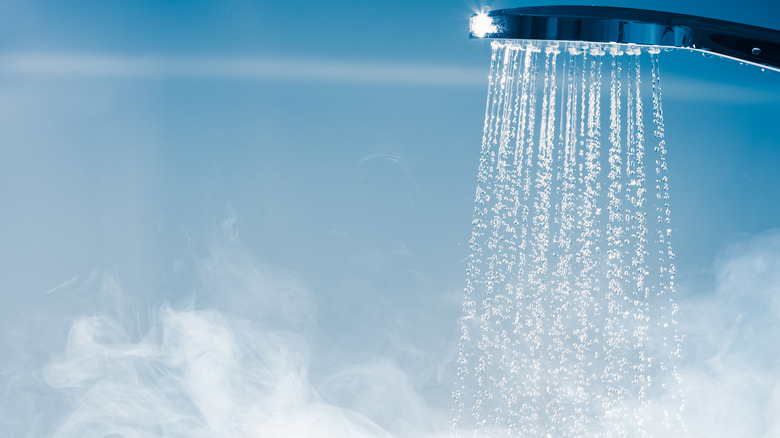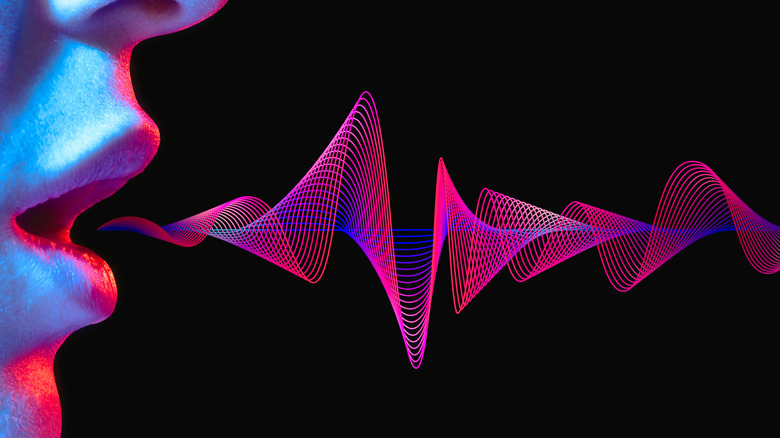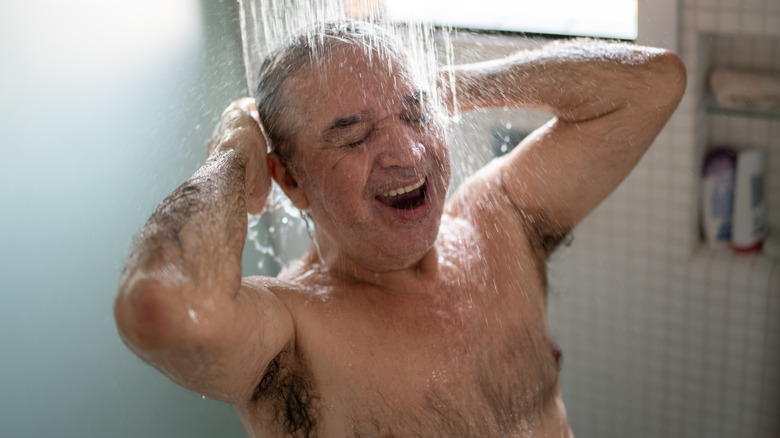The Scientific Reason You Think Your Singing Sounds Better In The Shower
Admit it: You've sung in the shower. Maybe it was a whispery hum, a pensive warble, a sonorous croon, or a ragged, out-of-tune belt, but you've definitely sung in the shower. Everyone's got their favorite shower song, probably something kept safe by a shower's solitude, or that showcases what you swear are overlooked skills. Some might opt for a Taylor Swift bop, others might roar their best bestial metal growl, while the truly daring might try something like Puccini's immense and grand "Nessun dorma" aria from the opera "Turandot." But no matter what, most people are certain — 100% — that their shower singing is absolutely, totally, completely awesome.
Well, we've got good news and bad news. The good news: Your voice really does sound better in the shower. The bad news: Your voice doesn't sound better in the shower because you're a better singer in the shower. You've got the exact same voice inside and outside of a wet, warm, and cozy environment. The difference rests in the environment itself, which is typically boxy, contained, and full of hard surfaces like tiles. As Elite Daily explains, this kind of room is great for one very specific vocal effect: reverb. For audiophiles in the house, reverb is an easy way to make a voice sound better when recording that isn't cheating, aka autotune. For everyone else, it's a kind of echo attached to a vocal line that makes a voice sound fuller, more resonant, and less out of tune.
Resonant, reverberating, and loud
If you happen to shower outdoors for whatever reason, or in a room without a roof, or in a room not made of porcelain tiles, you might not sound much better when you sing. Or, if your shower room happens to be a perfect cube and you're standing in the exact center of it, which would be weird. In any of these cases, there might not be much reverb, i.e., reverberation. As Premium Beat explains, reverb happens if two basic conditions are met: 1) Sound travels out in all directions, and, 2) That sound bounces back at different times. On the second point, showers are usually shaped like rectangular prisms, so one's voice bounces off of certain surfaces sooner than other surfaces. This is what creates reverb's layered echo, which Mic says makes your voice "hang" in the air longer.
Reverb becomes extra potent if sound bounces off of a hard surface, and continues to bounce multiple times. This is exactly what happens in a shower because of two additional reasons: 1) Showers are usually made hard surfaces like tiles, which reflect sound better than sound-absorbing soft surfaces, and, 2) Showers have a "cavity structure," as Mic puts it, meaning that they're not only fully contained on all sides, but small enough for sound to bounce around quickly and overlap again and again. This is why showers amplify certain frequencies and make them both more resonant — which can make them sound deeper — and louder.
Singing your heart out
There are a couple of other reasons why singing sounds better in the shower. Acoustically, as Classic FM says, showers can muffle one's voice while simultaneously amplifying it. Think about all the noise in a shower: The shower spraying out, the sound of it striking your body and pattering on the floor, your own movements and steps, grabbing for the shampoo, the click of the bottle, and so forth. People in that environment can't really hear clearly. So, even while your voice is projected to hard walls, bouncing around, and getting some reverb attached to it, it's also being muffled. This means that the rough edges are being shaved off, and you can't easily detect sharp or flat notes, or unevenness and imperfections in the voice.
And finally, folks think they sound awesome singing in the shower because showering itself is psychologically beneficial. Valley Oaks' Health Hub explains that showers reduce stress, decrease anxiety, increase energy, and release mood-boosting neurotransmitters like norepinephrine and serotonin. Cold showers, in particular, have proven extremely effective at supporting mental health, as UCLA Health describes. And shock of all shocks: Feeling happier makes people more likely to approach a situation positively. In other words, being in a cozy shower predisposes you to just enjoy singing and evaluate yourself less harshly. So does it matter that you're not actually a better singer in the shower? Not at all. Go for it — sing your heart out to an audience of one.


